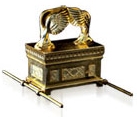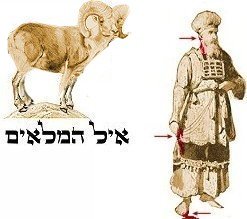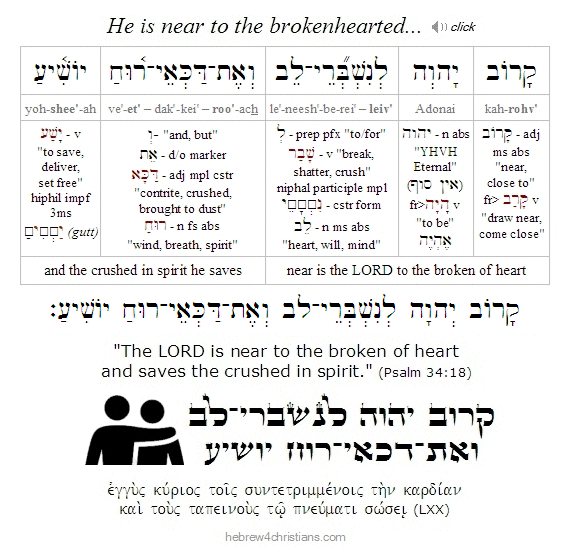|
When the LORD's anger was kindled against Moses for his reluctance to lead Israel out of Egypt (Exod. 4:14), God told him, "I had said you would be priest and he [Aaron] a Levite; now, however, Aaron will be a priest and you a Levite" (Zevachim 102a). When the LORD later spoke to Moses in Midian, "Go, return to Egypt, for those who seek your life are dead" (Exod. 4:19) the utterance split into two voices. Moses heard "Go, return to Egypt" while Aaron heard, "Go into the wilderness to meet your brother Moses" (Exod. 4:27).
In Pirke Avot 1:12, Aaron is said to "have loved peace and pursed it; he loved people and drew them close to the Torah." Aaron was said never to interrupt his friend's words nor to accuse others of sin. He greeted all men with love and dan l'kaf zechut (דָן לְכַּף זְכוּת) - with the benefit of the doubt. He was a peacemaker, a humble teacher, and healer. Some of the sages have even gone so far as to say that Aaron was greater than Moses himself (Avot d'Rabbi Nosson). Rashi says that Aaron's attribute of being ohev shalom - a lover of peace - therefore qualified him to become Israel's first High Priest.
Aaron's middot ha-lev (qualities of heart) sometimes made him subject to abuse from others. Aaron's pursuit of peace (אוֹהֵב שָׁלוֹם וְרוֹדֵף שָׁלוֹם) caused him to conciliate the unruly mob's demand for an idol to lead them back to Egypt. Aaron had hoped to "buy some time," since he prophetically knew that Moses was returning later that very day from the summit of Sinai. Even though he had at his disposal the army of the Levites to deal with the mob using force, he turned away from the path of violence and temporized instead. Later, after Moses returned and smashed the luchot (tablets), Aaron realized that a terrible thing had come to Israel through his action, and he therefore underwent a period of teshuvah (repentance). "He tied a rope of iron around his waist and circulated throughout the camps of Israel teaching the people. To whoever did not know prayer he taught prayer, to whoever did not know keriat Shema, he taught Keriat Shema, to whoever did not understand the essence of Torah, he taught the essence of Torah" (Yalkut Shimoni).
As mentioned in the parashah summary for Shemini, on each of the seven days of inauguration Moses anointed Aaron with holy oil. "He [Moses] disrobed him, washed him, anointed him between the eyes in the shape of a cross (the Greek letter Chi) with the oil of anointment, and then dressed him again. Moses repeated this for seven days, until the eighth day" (Midrash HaGadol, BaMidbar 7:1). After Aaron offered the sacrifices, the Divine Presence did not appear immediately, and Aaron was frightened that his sins were haunting him. According to the Sifra (midrash on Leviticus), Aaron thought the altar resembled the shape of an ox and he was afraid of it because it reminded him of the Golden Calf. His fear was preventing the revelation of God's love.
The great commentator Rashi notes that Moses' commandment to his brother Aaron, "Draw near to the altar" (קְרַב אֶל־הַמִּזְבֵּחַ) on the eighth day (Lev. 9:7), suggests that Aaron was still deeply ashamed over the Sin of the Calf. Though Aaron did not feel worthy to be the High Priest of Israel, Rashi states that Aaron was chosen precisely because of his shame. His reluctance and sense of utter unworthiness was the very reason why he was granted the role of Israel's High Priest. The service of God requires the death of the ego....

In similar measure, some of you might feel utterly unworthy of your high calling in the Messiah Yeshua. After all, you -- no less than Aaron -- are called to come before the Divine Presence and function as God's holy priests. But in similar measure, you -- no less than Aaron -- are unworthy for the role. Nonetheless you are chosen in your weakness; you are beloved because of your lowly standing; you are made "pure in heart" because you realize your own inner nothingness and need before the Savior.... Your brokenness is a gift that magnifies God's unending love and grace:
For consider your calling, brothers: not many of you were wise according to worldly standards, not many were powerful, not many were of noble birth. But God chose what is foolish in the world to shame the wise; God chose what is weak in the world to shame the strong; God chose what is low and despised in the world, even things that are not, to bring to nothing things that are, so that no human being might boast in the presence of God. (1 Cor. 1:26-29)
Your avodah (service to the LORD) is one of the sacrifice of praise for the salvation God has bestowed upon you. "Through him [Yeshua] then let us continually offer up a sacrifice of praise to God, that is, the fruit of lips that acknowledge his name" (Heb. 13:15).
Of course, such praise is often offered while in a state of suffering, but "though our outer self is wasting away, our inner self is being renewed day by day. For our light and transient troubles are achieving for us an everlasting glory whose weight is beyond description. We concentrate not on what is seen but on what is not seen, since things seen are temporary, but things not seen are eternal" (2 Cor. 4:16-18).
טוֹב־לִי כִי־עֻנֵּיתִי לְמַעַן אֶלְמַד חֻקֶּיךָ - "It is for my good that I have been afflicted; so that I would learn your decrees" (Psalm 119:71).
Rabbi Moshe of Kobrin used to say, "When a person suffers, he shouldn't say that things are bad. Rather, he should say that the situation is bitter. The Almighty does nothing bad. Just as medicine is beneficial, although it might be bitter, so too events are always beneficial even if they are bitter."
The sages sometimes say that God is often closer to sinners than to "saints." God in heaven holds each person by a string. When you sin, you cut the string; but then God ties it up again, making a knot - and thereby you are brought a little closer to him. Again and again your sins cut the string - and with each further knot God keeps drawing you closer and closer." (De Mello)
"God punishes the ungodly simply by ignoring them. This is why they have success in the world – the most frightful punishment, because in God's view this world is immersed in evil. But God sends suffering to those whom he loves, as assistance to enable them to become happy by loving him." (Soren Kierkegaard)
Hebrew Lesson
Psalm 34:18 Hebrew reading (click):
|





